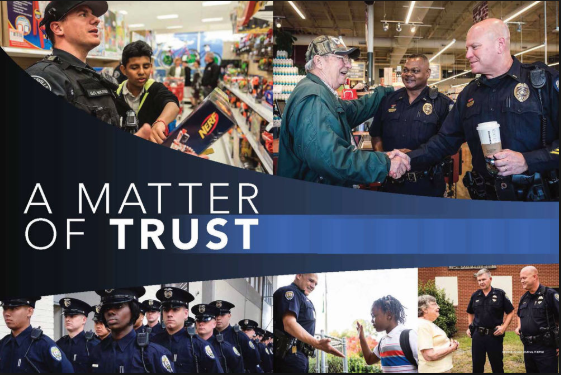By Joseph Hayashi
The topic of police and their actions has become a very hot button issue here in the U.S.. It has become a dividing issue between a lot of people in this country as well as in the world. There are many people who do not like discussing police or feel uncomfortable talking about it and I am no different. Having studied criminology/criminal justice and having worked with the Gilroy Police Department as a crime analyst, I feel like I have a decent background in the criminal justice field but that still doesn’t change my uncomfortability around the subject. I understand why many citizens here are afraid/uneasy when it comes to police but I also understand that police are very important. They are still the ones protecting us and are the ones that run towards gunfire when everyone else will run away.
This is why I was very excited to here from former Salinas police chief Kelly McMillin. I really wanted to hear more from the perspective of a career police officer and I was not disappointed from his talk. Kelly was very energetic and knowledgeable about the subject of police and was able to give great insight into what police had to go through in their career. I was especially grateful for his insight on the emotional part of being a police officer when it came to police having to shoot perpetrators. I have met and befriended many police officers while at GPD, I even had a long time high school friend that is an officer there, and I have been fortunate enough for them to share with me about how they feel about shooting people. I feel like there is this perception going around that police enjoy using their guns or that they are unaffected by using them. While this is still a possibility for some officers, every officer I have talked to has told me that they hate it when they are put in a situation that has them shoot someone. I was especially grateful for Kelly being willing to share his experience with the connection between officers and drinking. Having a cousin that just retired from being an officer his whole life, it was hard to watch him drink so much. It was clear to many of us in the family that his drinking was connected to his job as an officer.
I was also grateful that Kelly was able to go in the gang violence and history of gangs in Salinas. Having grown up in Castroville, I have had connections to gangs my whole life. I have friends that ended up in those gangs and my family were friends with families that were in gangs. Going to MIIS is especially aggravating for me because when I talk to some other students about this problem, they either don’t believe me or don’t really think it is that bad here just because other places in the world and county have it worse. I am not saying Salinas is the worst; I just want people to acknowledge that Salinas has a problem with violence too.
While I am grateful and agree with Kelly on a lot of things that he talked about, there were still some things I had trouble hearing. I love the fact that Kelly brought up the issues that are contributing to kids going to gangs like family and friend social pressures, low economic opportunities, and fear because these are very important factors that need to be addressed. My only problem though is how to address these issues. While I do agree that these issues should not be the issues that police have to address, how could other city departments address them when they receive so much less funding than the police department. The police department in Salinas, and this is the same in all other cities, receives a significant amount of more money than any other city department. I’m glad that Kelly did mention the fact that police departments usually get what they want because this is a well known fact around other city departments. I believe that this is because there are some that still see gangs as a public safety problem when there is a growing trend of seeing it as a public health problem. I do wish we had touched more on this issue.
I also wish that we had touched more on the idea of intelligence led policing. I know that I am biased on this issue because I am a crime and intelligence analysis but I really do believe in the idea of placing an officer in an area because the data and trends tell us that is the most likely place a crime will occur. I think this is especially important and true while we are experiencing this deficit in police in a lot of the departments. I think data led policing is a lot more useful than having an officer on every corner because of the community fear of police going on right now and because we need to save on resources as much as possible. But I do see the need for police interaction with the community and for the community to see the police so that they can gain their trust in the police again.
I obviously don’t have the answers for the issue of the perceptions of police in this country but I think having an open dialogue with citizens is a start and I really am grateful and appreciative of Kelly giving us more insight into the the officer’s side of things.



